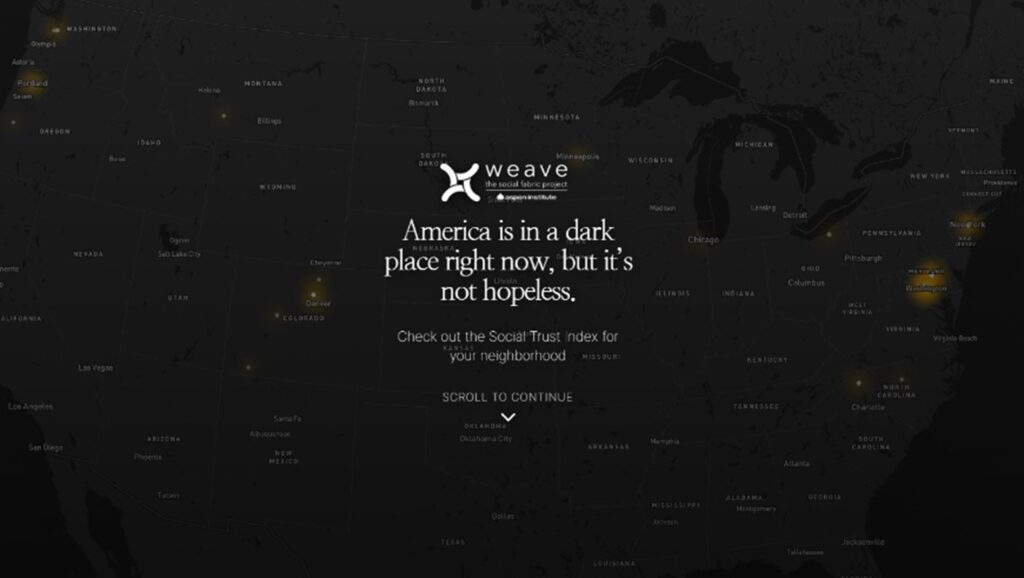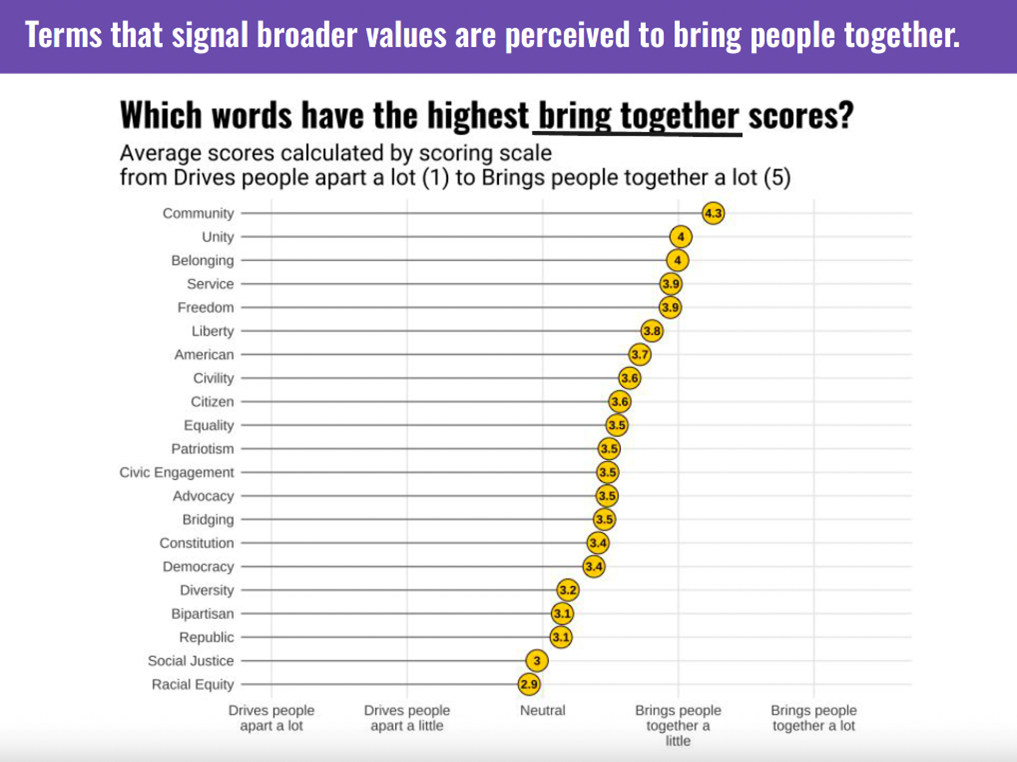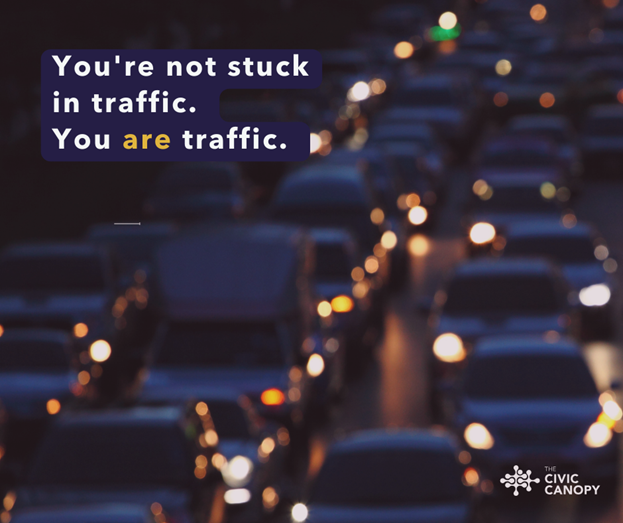During a recent panel discussion on the future of democracy, a community member stood up to tell a story of repeatedly asking her daughter, who had recently turned eighteen, if she was voting in the upcoming election. Each time, her daughter seemingly brushed it off, rolling her eyes, shrugging her shoulders, or just looking at her phone. So much so, that it was making her mom anxious, but determined to ask again. This time, her daughter broke down crying and said, “Of course, I’m voting, Mom. That was never a question. There’s so much on the line, that I’m just scared.” She talked about growing up in a world that seemingly has a threat at every corner from school shootings to climate change. Suddenly this mom realized that what she had seen as disinterest was actually an anxiety that matched her own.
Throughout this same panel discussion, the crowd talked about how much polarization was hurting our democracy, but one participant took the mic to describe an even bigger threat he saw: the disinterested majority. This is the number of Americans growing increasingly disinterested or feeling plain “meh” about politics, and a sense of apathy that any one person can make a difference. If this number of folks who are fed up with our current way of working stays the same or continues to grow, we’re in trouble. But in a turn of events, this disinterested majority could be our greatest asset in combatting polarization, because these folks all have one huge thing in common: they don’t believe our democracy is working, and they’re not entirely wrong either. The Brookings Institution has been researching democratic decline for a while. While the Brookings looks at what happens in our democratic structures (elections, executive branch), we also need to look at how to turn the tide in our culture of democracy to activate the disinterested majority.
Here are three strategies we can use when interacting with folks who are turning away from civic engagement.
Switching from “They” to “We”
The first strategy invites a mindset shift. People often talk about issues with democracy or government as things outside of themselves, which makes said issues something that someone else is both responsible for and needs to fix. If we’re to realize a dream of democracy that says this is a government for and by the people, we need to recognize that we are democracy and we are our government.
Let’s think of this another way. One of the questions we ask one another often when arriving somewhere is, “How was the traffic?” This makes it sound like traffic is something that exists outside us, that we’re not participating in or contributing to the problem of heavy traffic. The reality is that you’re not stuck in traffic, you ARE traffic. Traffic wouldn’t exist without each of our individual actions. In a similar move, we can move to use language that helps us to recognize that we are democracy and we’re impacting its success or failure by choosing not to participate (kind of like public transit).
Rebuilding Community Trust
The Colorado Health Foundation’s Pulse Poll recently asked Coloradoans about their sense of belonging. 40% of people say they feel like they don’t belong somewhere because of their political beliefs. This was higher than age, race, culture, weight, religion, and gender. This can become something that Coloradoans can identify as an area of common ground, even if their political views differ.

The Aspen Institute has been looking at similar information nationally as part of a Social Trust Index that measures how much people in a community engage in trust behaviors, trust the intentions of their neighbors, and have trusting spaces where people can come together across differences. You can learn about your community’s trust index by entering your zip code to see results near you and find communities across the U.S. that are similar to yours when it comes to trust.
There’s hope. While it can sound daunting that only about half (52.6%) of Coloradoans experience belonging in their local communities according to the Colorado Health Institute Belonging Barometer, our scores are much higher than the national average of 26%.
When we experience trust in our communities, we’re more likely to work alongside our neighbors to create the types of communities we want to live, work, play, and pray. This is democracy in action.
Discovering Bridging Language
CBS Sunday Morning recently had a segment called, “Politics (and deep fried pickles) at the Wisconsin State Fair.” In it, journalist Ted Koppel, asked Wisconsinites about their thoughts on common topics in the upcoming election. Here’s one exchange:
Ted Koppel: “Have you heard the term woke?
Interviewee: “Yes.”
Ted Koppel: “What does that mean?”
Interviewee: “I don’t like it.”
Ted Koppel: “What does it mean?”
Interviewee: “I don’t really know.”
Ted Koppel: “Well, what do you think it means? You don’t like it.”
Interviewee: “I just know it’s shoved down my face and I don’t like it.”
Whether or not you agree with the interviewee, you can see the ways that words have deep emotional connections regardless of their actual meaning. Some words quickly shut down a conversation unless we’re able to unpack the feelings behind them, other words can help connect people with different points of view.
Philanthropy for Active Civic Engagement (PACE) conducted research into how civic language unites, divides, and motivates American voters. They found that words like “community,” “unity,” “belonging,” and “service” have the greatest potential to bridge folks in conversations about what they hope for the future of our democracy. They even found that some words help to motivate toward actions like helping others in your community, standing up for causes that you care about, and voting.

This doesn’t mean that we avoid talking about “woke” and only talk about “unity.” Rather, we can use “unity” as a word that helps to open doors and start conversations. Then we can build relationships that start to foster enough trust for everyone to be willing to listen to folks before engaging in dialogue on the words that divide us.
The Takeaway
The number of people who are tired of the two-party system and the dwindling approval ratings for our presidents can be seen as dismal. However, they can also be important signs of an emerging opportunity. These can be signs that something needs to change for our democracy to thrive and you’re likely to find someone who feels similarly in your own neighborhood. The three strategies I’ve outlined today are things that anyone can do, no matter how much power, influence, or money you have. Together we can create communities that care enough about each other to talk to one another, so when it comes time to make decisions we’re rooted in our common humanity and purpose: a country run for the people, by the people.


